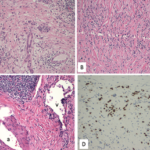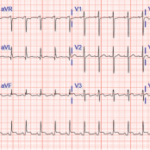In early October, the FDA approved avacopan to treat anti-neutrophil cytoplasmic antibody associated vasculitis. Here are insights into the treatment’s risks and considerations.


In early October, the FDA approved avacopan to treat anti-neutrophil cytoplasmic antibody associated vasculitis. Here are insights into the treatment’s risks and considerations.

Ghalandari et al. sought to validate the guidance outlined by EULAR for the use of anti-rheumatic drugs during pregnancy, finding that following its guidance for tumor necrosis factor inhibitors led to no or low concentrations of these agents in cord blood.

Sarah D. Bayefsky, MD, Kimberly DeQuattro, MD, & Rebecca E. Sadun, MD, PhD |
Approximately 50% of young adult patients with childhood-onset rheumatic diseases become lost to follow-up within the first year of transferring to adult rheumatology care, mirroring the statistics of other subspecialties.1,2 One of the challenges cited most consistently by young adult patients and their families relates to differences between rheumatology care delivery in the pediatric and…

“Maria” is a 54-year-old woman with seropositive rheumatoid arthritis, as well as hypertension and hyperlipidemia. She is a new patient in your clinic following a move across the country to live with her children on a farm in a rural area of the Midwest. At her first visit, three months ago, you and Maria agreed—through…

Vaidehi R. Chowdhary, MD, & Jane E. Dee, BA, MALS |
The COVID-19 pandemic exacerbated wide disparities that exist in the U.S. healthcare system. During the pandemic, the clinical practice in the Section of Rheumatology, Allergy & Immunology at Yale School of Medicine (YSM), New Haven, Conn., rapidly pivoted from face-to-face visits to telehealth to keep our patients and providers safe. Many patients quickly adapted and…
ChemoCentryx |
On Oct. 8, ChemoCentryx Inc. announced that the U.S. Food & Drug Administration (FDA) has approved avacopan (TAVNEOS), an orally administered selective complement 5a receptor inhibitor, as an adjunctive treatment of adult patients with severe active anti-neutrophil cytoplasmic autoantibody-associated vasculitis (ANCA-associated vasculitis), specifically granulomatosis with polyangiitis (GPA) and microscopic polyangiitis (MPA) (the two main forms…

Contraception, disease control, family planning and managing life with an infant—five experts addressed these concerns and more for patients with rheumatic disease during a special online webinar.

Kelly April Tyrrell & Gretchen Henkel |
Marian Hannan Celebrated after 10 Years as AC&R Editor-in-Chief By Kelly April Tyrrell This summer, the 10-year tenure of Marian Hannan, MPH, DSc, as editor in chief of Arthritis Care & Research (AC&R), has come to an end. Kelli Allen, PhD, assumed the post on July 1. “Marian has done a fantastic job over the…

Veronica Matto, DO, Rajshri Shah, MD, Jie Ouyang, MD, PhD, Cory Perugino, DO, & Joseph J. LaConti, MD, PhD |
Sarcoidosis and IgG4-related disease (IgG4-RD) are both immune-mediated, often multi-organ, diseases of uncertain etiology capable of presenting with diverse clinical manifestations. Many clinical features are common to both conditions, including hypergammaglobulinemia, the ability to form inflammatory masses and involvement of the lymph nodes, lacrimal glands, salivary glands, meninges and lungs. Although imaging modalities, such as…

Haseeb Chaudhary, MD, Prem Parajuli, MD, & Devy Setyono, MD |
The incidence of drug-induced lupus continues to rise as clinicians expand their therapeutic armamentarium. An estimated 15,000–30,000 cases of drug-induced lupus occur every year in the U.S. alone.1 It is a well-known, but rare, complication of commonly used medications, such as anti-hypertensive, anti-arrhythmic and anti-epileptic drugs, as well as biologic and immune checkpoint therapies.2,3 The…